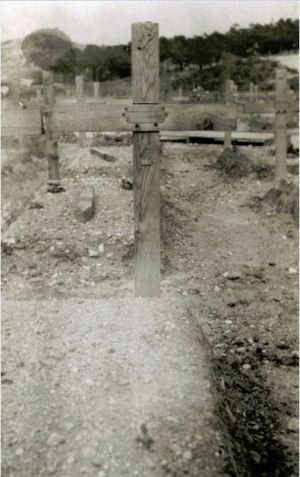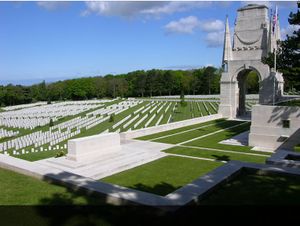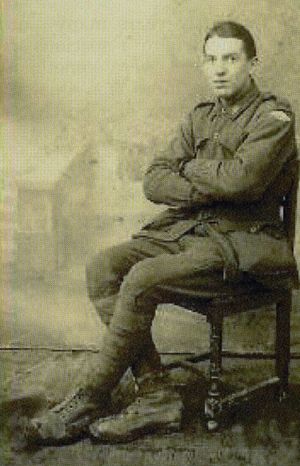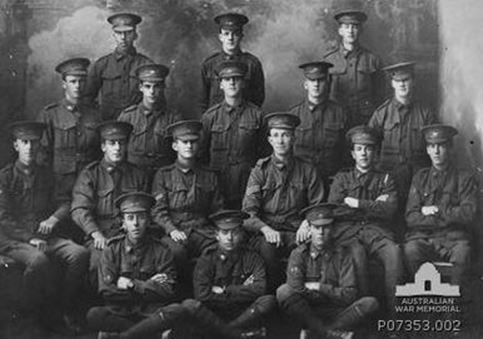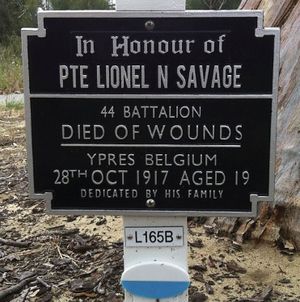Lionel Newton Savage
From Our Contribution
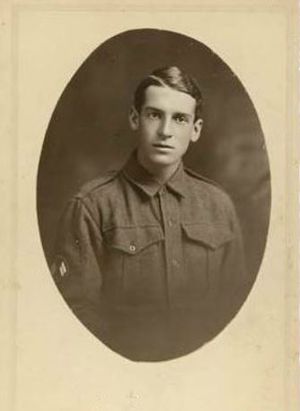 Australian War Memorial c1916 PO7353.001 | |
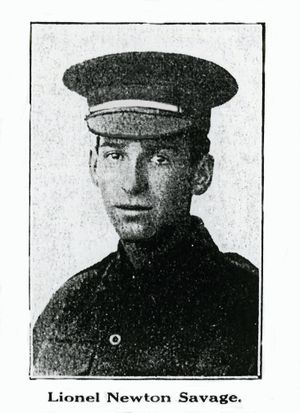 The drill of the Foot-Hills 1918 Jan-Feb edition, P.4 | |
| Personal Information | |
|---|---|
| Date of Birth | c1899 |
| Place of Birth | Hendon, Middlesex, England |
| Death | 28 Oct 1917 |
| Place of Death | 7th Canadian General Hospital Étaples, France |
| Age at Enlistment | 18 years old |
| Description |
5' 9¾" (1.77m) tall ; 133 lbs 60.328 kg ; fresh complexion ; brown eyes ; dark brown hair |
| Occupation | Electrician |
| Religion | Church of England |
| Address | 'Linlithgow', Kelmscott, Western Australia |
| Next of Kin | Father , Mr Thomas Lionel Savage |
| Military Information | |
| Reg Number | 971 |
| Date of Enlistment | 13 Dec 1915 |
| Rank | Private |
| Unit/Formation | 44th Battalion Headquarters Company / 11th brigade, 3rd Division |
| Date of Embarkation | 6 Jun 1916 ‒ 21 Jul 1916 |
| Ship Embarked On | HMAT A29 Suevic |
| Fate |
Wounded in Action 18 Oct 1917 Battle for Passchendaele Died of those Wounds on 28 Oct 1917 |
| Monument |
Kelmscott Congregational Church Honour Board Kelmscott War Memorial (South panel) Australian War Memorial |
| Medals |
British War Medal Victory Medal |
Pre War
Lionel was born at Kilburn, London in November 1897. He was one of four sons and a daughter to Thomas and Laura Savage of Forest Gate. He attended school at Bethany House, Goudhurst, Kent in England and after leaving school commenced work in an electrical apprenticeship at Byford, England. Lionel arrived in Perth with his family on1 Dec 1913 and gained employment at Chas Atkins and Company through his electrical training. He attended the Kelmscott Congregational Church and was the secretary of the Sunday school.
War Service
Prior to leaving Australia Lionel was trained as a signaler (he was morally opposed to taking life) and posted to the Signaling Section attached to the 44th Battalion Head Quarters. During the passage from Fremantle to England, he was admitted to the ship's hospital for 2 days with bronchitis. On arrival in England, along with the rest of the 3rd Division units, his battalion undertook 4 months training to bring them up to battle readiness. They were housed at Camp 13 at Larkhill, not far from Stonehenge
The battalion proceeded to France via Southampton on 25 Nov 1916 after being reviewed by the King. Disembarking at Le Havre at 6.30am on the 26th and the battalion spent two days in a 'rest camp' before it entrained on the 27th for Steenwerck where they went into reserve, remaining there until 22 Dec 1916. After inspection by Gen Sir Douglas Haig they moved to Armentieres, still in reserve until they moved into the line for the first time east of Armentiès on 30 Dec 1916. They remained in the line until relieved by the 42nd Battalion on 5 Jan 1917, and returned to the front line after a rest on 24 Jan 1917 for a further five days.
February was spent in the Armentieres area before moving to Ploegsteert (Woods) in the middle of March. On 4 April 1917 they were withdrawn from the front lines / reserves and spent most of April and May providing troops for working parties. On 7 June 1917 they participated in the attack on Messines Ridge as the reserve battalion, moving forward on the 8th to capture the green line, while taking very few casualties. However, they then were to lose up to 300 casualties defending their new positions, twice having to fall back under shelling by their own artillery. They were relieved by the 43rd Battalion on the night of 11/12th June, but returned to the front line for a further 5 day stint on 22 Jun 1917. They next went into the front lines on 6th July for another 5 days and carried out patrol work. During July while in the front line trenches, the men were in water and mud up to their waists. The first three weeks in August were spent as reserve before being withdrawn from the front entirely to regroup, retrain and take on reinforcements during September.
From the 44th Battalions War Diary, Lionel was one of 5 Officers and 80 men who were either Killed in Action or Died Of Wounds received during October while they were in the front line to the east of Ypres. On the 18th October they had been pulled back to Hill 40 where they were in reserve, so it is likely that his wound was caused by enemy artillery. The wound was a compressed fracture to the base of his skull.
His Red Cross file [1] contains a letter from the Officer Commanding 7th Canadian General Hospital
.."This patient was admitted in an unconscious condition, suffering from Compound fractures to the base of skull, the result of a shell wound on 20.10.17 and remained unconscious until his death on 28.10.17. He was buried 29.10.17 in grave No. V407 at the Étaples Military Cemetery with full military honours."
In the 11 months that Lionel served in France he appears to have remained with the 44th Battalion without incident until he was wounded.
Post War
Lionel's parents moved to Leake Street, Victoria Park in late 1917 and to Carlisle in 1923.
Notes
Buried in ÉTAPLES MILITARY CEMETERY - Plot XXX, Row G, Grave 20. Son of Thomas Lionel and Laura Kate Savage of Carnarvon Street, Carlisle, WA. Native of Forrest Gate London. Étaples is a town about 27 kilometres south of Boulogne.
For further information relating to Lionel's time with the 44th Battalion see Eggs-a-Cook The Story of the Forty Forth War - as the Digger Fought It. Capt C. Longmore The Imperial War Museum.
- ↑ "Australian Red Cross Wounded and Missing Files - Lionel Newton Savage". Australian War Memorial. 2018. Retrieved 2 May 2018.
